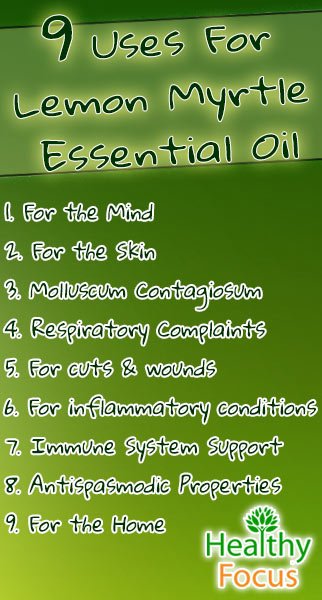Lemon Myrtle Essential Oil
Lemon Myrtle (Backhousia citriodora) is a rainforest tree which grows natively in tropical and subtropical areas of Australia’s East coast although it now cultivated in several other regions of the world including South Africa, Europe and The southern regions of the USA.
Its essential oil which is derived by steam distillation is not widely used as some essential oils, but its therapeutic benefits are becoming increasingly appreciated. It is especially well known for its uplifting and calming properties as well as potent anti-viral activity and has been listed as a therapeutic product under Australia’s Therapeutic Goods Administration Act.
As well as its therapeutic uses, lemon myrtle essential oil has a wonderful, uplifting and rich lemon aroma that even people that do not like citric aromas find refreshing and pleasing. Its scent has been described as a combination of lemon, lime, and lemongrass and is often referred to as more lemony than lemons.
Lemon Myrtle essential oil is a rich source of a chemical substance known as citral which is the source of many of its therapeutic uses. It is, in fact, the purest and most potent natural source of citral containing over 90% which compares very favorably with other lemony products.
Citral has natural anti-viral actions which have proven more active than many other anti-virals such as camphor. Lemon myrtle oil is also a very potent natural anti-oxidant properties and is rich in phenolic compounds, folate, lutein as well as vitamins A, and E. Lemon myrtle is also rich in many essential minerals such as zinc, calcium, and magnesium necessary for a host of bodily functions.
Properties of Lemon Myrtle Essential Oil
Lemon Myrtle essential oil derives its therapeutic benefits from its abundance of medicinal properties which include:
• Antifungal
• Antispasmodic
• Antibacterial
• Sedative
• Antimicrobial
• Anti-inflammatory
• Antiseptic
1. For the Mind
Lemon Myrtle essential oil has a host of physical benefits, but it is also a great oil to use for a variety of conditions associated with the mind. It has an uplifting aroma and sedative properties that can be used to calm the mind in times of stress or anxiety properties.
It can also be used before bed to ensure that you get a good night’s sleep which is good news for those suffering from insomnia that rely on often addictive and potentially dangerous pharmaceutical medication.
2. For the Skin
The antiseptic and antifungal properties of lemon myrtle essential oil make it ideal to treat a range of dermatological conditions including acne, psoriasis, and eczema. It can also be used to treat cold sores, warts and it to reduce the redness and soreness of rashes.
And that is not all; it can also be applied to help ease itchiness and inflammation. Be sure to dilute the oil suitably according to the manufacturer’s instructions before applying the oil topically. For acne, most experts recommend dipping a cotton ball into some clean distilled water and then adding a single drop of lemon myrtle oil before applying the cotton ball to the affected areas.
3. Molluscum Contagiosum
This is a viral infection which afflicts the skin; while it most commonly occurs in children it can affect people at any age and is increasingly being transmitted sexually in young adults. Because traditional treatment methods are invasive and require tissue damage which is accompanying pain, the search has been on for a gentler and more natural remedy.
A study published in 2004 demonstrated the effectiveness of lemon myrtle essential oil to treat the condition. 9 out of 16 of the children treated topically with lemon myrtle oil experienced a 90% reduction in the number of lesions after 21 days compared with none of those treated with a vehicle oil experiencing improvements. In addition to the positive effects, no adverse reaction was reported by any of the subjects. (1)
4. Respiratory Complaints
Lemon Myrtle essential oil has a growing reputation when it comes to dealing with respiratory complaints. It can help to reduce the incidence of the common cold and influenza, and when the vapors are inhaled, it can treat sinus issues, congestion, and bronchitis.
A few drops used in a gargle mixture with water can deal with bacterial throat infections.
5. For cuts and wounds
The potent antibacterial properties of lemon myrtle essential oil make it especially useful in treating cuts and minor wounds. It can destroy bacteria and prevent it from spreading further. This oil can also help ease itchiness and irritation caused by insect stings or bites.
6. For inflammatory conditions
Lemon Myrtle essential oil can help with a range of inflammatory conditions and is said to provide effective relief against rheumatism.
Add a few drops to your bathtub, then take a relaxing soak and feel the aches and pains disappear.
7. Immune System Support
Lemon Myrtle essential oil is said to be capable of boosting the immune system which is good news for everybody and especially those with weakened systems that are prone to sickness. Try using lemon myrtle oil to keep common annoyances like the cold at bay.
8. Antispasmodic Properties
The antispasmodic properties of lemon essential oil give it a wide range of applications when it comes to conditions caused by spasms. It is known to help alleviate stomach cramps or spasms and infections which result from an adverse reaction to food.
9. For the Home
Because of its delightful lemony smell and its antiseptic qualities, lemon myrtle essential oil has applications beyond physical and mental therapy. Its smell alone, when diffused at home, is enough to lift the spirits of the entire family and it can help to get rid of any lingering odors from cooking or tobacco.
You can also use this oil to cleanse the home especially areas prone to bacterial build up like the kitchen or the bathroom. Just mix a few drops with clean water then wipe down your surfaces or any nooks containing long forgotten grime.
There is plenty of anecdotal evidence online that lemon myrtle oil can help to keep a variety of bugs such as silverfish and moths at arm’s length.
How to Use it
There are a variety of ways in which you can enjoy this wonderful essential oil. How you do so will depend very much on whether you are using it for its health benefits or simply to create a fresh household fragrance. While this is far from exhaustive, these are some of the most common methods of use.
- To make a soothing and aromatic massage blend, simply dilute your lemon myrtle oil in the necessary quantities with your carrier oil of choice.
- Add a few drops to a warm bath for an even more relaxing experience.
- Diffuse the oil before bedtime to ensure a good night of sleep.
- To help with respiratory and sinus issues, add a few drops to a sink full of hot water and inhale its vapors.
Precautions
- There is no information regarding any specific dangers and lemon myrtle oil is considered to be safe and not toxic.
- Pregnant and breastfeeding women should not use this or any other essential oil unless they have spoken to their health provider first.
- Make sure that you dilute lemon myrtle essential oil before topical use and be sure to test it on a small area of skin first.
- Because of its citric nature, lemon myrtle essential oil might be photosensitive, and it is recommended that you avoid exposure to direct sunlight for at least 48 hours after applying it to your skin.
- Citrus oils are not recommended to be used in ultrasonic diffusers as they may cause damage to the units.



Leave a Reply
You must be logged in to post a comment.